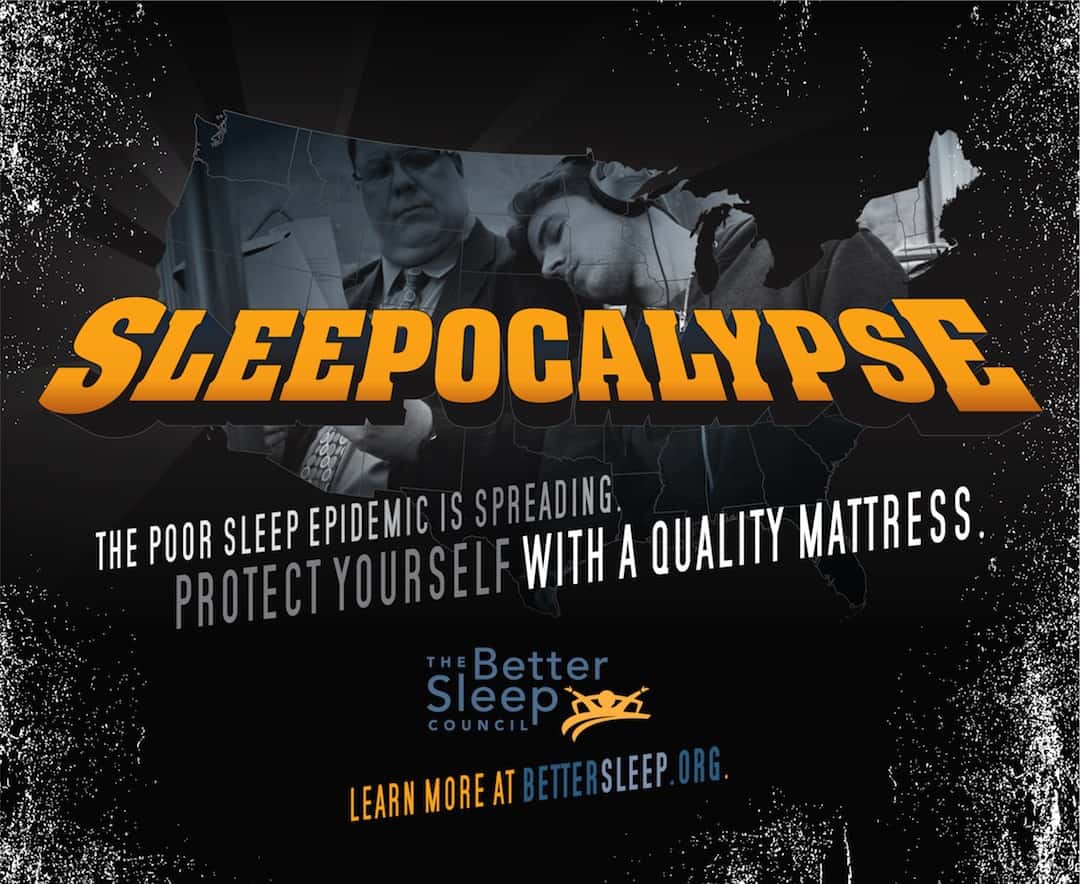FOR IMMEDIATE RELEASE
Date: April 30, 2013
Contact: Karin Mahoney
[email protected]
(703) 683-8371, ex 1131
Chris Sledzik
csledzik@marcusthomasllc
(216) 514-4573
SLEEPLESS EPIDEMIC: FIVE WAYS YOU CAN AVOID THE “SLEEPOCALYPSE”
Better Sleep Council Survey finds more than half of sleep-deprived
Americans know how to get better sleep but don’t act on this knowledge.

Based on a recent Better Sleep Council survey, half of American adults admit they are sleep deprived. And the majority of those 157 million Americans aren’t taking simple daily precautions to get better sleep – even though they know simple actions can lead to more restful nights.
Spurred by the Centers for Disease Control’s confirmation in March 2013 that insufficient sleep is a public health epidemic, the Better Sleep Council set out to prevent what it calls a “Sleepocalypse” by helping people achieve the health benefits of better sleep. Focusing on proactive sleep-health measures all Americans can take, the non-profit research and education group identified gaps in what people SAY they believe leads to better sleep and what they actually DO to achieve a good night’s rest. The Better Sleep Council also tested Americans’ knowledge of the mental and physical consequences of sleep deprivation.
“Simple things like turning off cell phones, not eating in bed and sleeping on a comfortable mattress rank highest on the list of missed opportunities,” said Karin Mahoney, director of communications, Better Sleep Council. “Part of the problem is that people think they can push through their lack of sleep without negative effects. Men, in particular, are more likely to believe they can train themselves to function normally on less sleep, but studies show that just isn’t true.”
In support of its “May is Better Sleep Month” campaign, the Better Sleep Council is prescribing simple changes to bedtime behaviors and sleep environments to help Americans escape the Sleepocalypse. Be sure to check out the full breakdown of America’s sleep discrepancy in the Better Sleep Council survey stat sheet.
1) Reduce electronics use in the bedroom, specifically in bed.
- Stats: 92% of Americans watch TV, check their smartphones, etc. in bed; 37% know they shouldn’t.
- Science: Intense back lighting of electronics triggers stimulating chemicals in the brain that tell our bodies it’s time to be awake.
- Advice: “We recommend powering off 1 hour before bed and sticking to hard copies to read in bed with soft lighting.”
2) Keep a consistent bedtime and wake up time.
- Stats: 78% Americans don’t do this; 69% know they should.
- Science: Your body uses a Circadian rhythm to regulate states of being asleep and awake; straying from your regular sleep schedule can confuse this rhythm and the effect can be felt for days. After just one night of insufficient sleep, cognitive abilities, reaction times and memory have been shown to decrease significantly, even when participants thought they were functioning relatively normally. And bad news—this effect accumulates over time. We cannot train ourselves to function as normal on less sleep.
- Advice: “Consistency is important. In addition to a morning alarm clock, set a ‘bed time’ alarm that reminds you to go to bed and get a full night’s rest. Or even better, set an alarm for your nightly wind-down an hour before bedtime. (See #4).”
3) Don’t let your cell phone be a distraction.
- Stats: Nearly 4 of 5 Americans don’t turn off their cell phone at bed time; 38% of 18-34 year olds use phones/tablets in bed EVERY night.
- Science: Because phones – smartphones in particular – represent a source of stress during the day, their proximity to the bed can disrupt sleep – even if it doesn’t make noise during the night or is set to vibrate.
- Advice: “Buy a $5 alarm clock and exercise the ‘power down’ feature as part of your bedtime routine. If that’s not enough, consider keeping your phone in a separate room. At a minimum, keep it out of reach.”
4) Have a wind-down period leading up to bed.
- Stats: 3 of 4 Americans don’t; two-thirds know they should.
- Science: Various physical and mental stimulants can prevent sleep, including lights, stress, caffeine, alcohol and many more.
- Advice: “Create a routine the last hour before bed that allows you to relax. Remove distractions that may send the wrong message to your brain. Your body needs to receive both physical and mental cues that you are ready for sleep.”
5) Make sure you have a comfortable, high-quality mattress.
- Stats: 62% of Americans who sleep well “strongly agree” a comfortable mattress contributes to quality sleep, making this the top factor for them;
- 83% know it’s important, but only 43% actually act on it.
- Science: Timely replacement and mattress quality can have a positive impact on sleep and overall quality of life.
- Advice: “Do the math on how much time you spend with your bed compared to other possessions; at approximately 240 hours/month, a mattress gets more use than most major purchases other than a home.”
“Cheating yourself of sleep can lead to dire consequences over time,” said Mahoney. “While we believe strongly that the sleep advice listed here can help lead to more restful, healthful sleep, we encourage people with chronic sleep issues to speak with their doctors and address other potential health conditions.”
About the BSC
The Better Sleep Council is the consumer education arm of the International Sleep Products Association, the trade association for the mattress industry. With decades invested in improving sleep quality, the BSC educates consumers on the link between sleep and health, as well as the role of the sleep environment, primarily through www.bettersleep.org, partner support and consumer media outreach.
# # #




